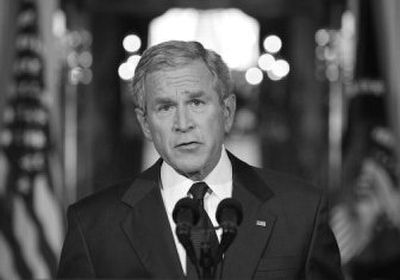Bush, Democrats working on compromise

WASHINGTON – President Bush will meet with the Democratic leaders of Congress at the White House today to discuss what to do about Iraq after Bush vetoed the Democrats’ war-funding bill on Tuesday because it contained a timeline for withdrawing U.S. troops.
A bipartisan consensus appeared to be growing on Capitol Hill that any new bill to support U.S. troops in Iraq must contain benchmarks for political progress by the Iraqi government – with consequences if the Iraqis fail to meet them. But it remained unclear what benchmarks or consequences Republican lawmakers or the White House would accept, or whether congressional Republicans would continue to stand with Bush.
As he repeatedly had threatened, Bush vetoed the $124 billion war-spending bill on Tuesday because of its timeline for withdrawing U.S. troops from Iraq.
“It makes no sense to tell the enemy when you plan to start withdrawing,” Bush said at the White House. That “would be setting a date for failure, and that would be irresponsible.”
Bush’s veto – the second of his presidency – sets the stage for compromise. Aware that they lack a two-thirds majority to override the veto, congressional Democrats are searching for terms that could pick up enough Republican support to prevail while appealing to anti-war Democrats.
After Bush spoke, Senate Majority Leader Harry Reid, D-Nev., and House Speaker Nancy Pelosi, D-Calif., faced the TV cameras and vowed to work with Bush but not yield to him.
“The president wants a blank check. The Congress is not going to give it to him,” Pelosi said.
While Bush has insisted that he’ll accept no withdrawal timeline, White House aides have signaled that some performance benchmarks for Iraq could be negotiable.
As the legislation headed Tuesday to its inevitable veto, several Republicans expressed frustration that Bush and the Democratic leadership had insisted on a showdown rather than serious closed-door talks.
“There are a number of Republicans who do think that some kind of benchmarks, properly crafted, would actually be helpful,” said Senate Minority Leader Mitch McConnell, R-Ky.
Bush’s veto capped a day heavy in symbolism for congressional opponents of the war and for a president who’s staked his legacy on Iraq. Both sides are trying to rally public opinion behind their stands.
Pelosi and Reid sent the bill to the White House after a Capitol Hill signing ceremony. It coincided with the fourth anniversary of Bush’s landing on the USS Abraham Lincoln aircraft carrier to proclaim that major combat was over in Iraq. He gave the address under a now-infamous banner that read “Mission Accomplished.”
The White House countered with stagecraft of its own.
Bush delivered an afternoon speech at U.S. Central Command in Tampa, Fla., where he said that removing U.S. forces from Iraq would turn the country into a “cauldron of chaos.”